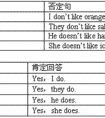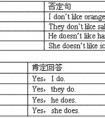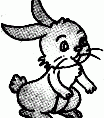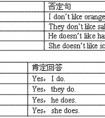按要求完成下列句子。1. I can play cards. (改为否定句)______________________________________________________________2. There are six cats. (对画线部分提问)___-三年级英语
情态动词两要点;动词原形跟后面,说话语气较委婉,can表"能力"may"许可",must"责任"或"义务",否定回答"needn't"换;should"应该",would"愿",have to "被迫"表客观.
注释:对must构成的一般疑问句作否定回答只能用needn't.
比较can 和be able to:
1.can/could 表示能力;可能 (过去时用could), 只用于现在式和过去式(could)。
be able to可以用于各种时态。例如:
They will be able to tell you the news soon. 他很快就能告诉你消息了。
2.只用be able to的情况:
a.位于助动词后。
b.情态动词后。
c.表示过去某时刻动作时。
d.用于句首表示条件。
e.表示成功地做了某事时,用was/were able to,不能用could。例如:
He was able to flee Europe before the war broke out.= He managed to flee Europe before the war broke out.
他在战争爆发之前逃离欧洲。
注意:could有时不表示时态
1.提出委婉的请求,(注意在回答中不可用could)。例如:
Could I have the television on? 我能看电视吗?
Yes, you can. / No, you can't. 可以/不可以。
2.在否定句、疑问句中表示推测或怀疑。例如:
He couldn't be a bad man. 他不大可能是坏人。
比较may和might:
1.表示允许或请求;表示没有把握的推测;may 放在句首,表示祝愿。例如:
May God bless you! 愿上帝保佑你!
He might be at home. 他可能在家。
注意:might 表示推测时,不表示时态,只是可能性比may 小。
2.成语:may/might as well,后面接不带to 的不定式,意为"不妨"。例如:
If that is the case, we may as well try.如果情况确实如此,我们不妨试一试。
比较have to和must:
1.两词都是“必须”的意思,have to 表示客观的需要,must 表示说话人主观上的看法,既主观上的必要。例如:
My brother was very ill, so I had to call the doctor in the middle of the night.
弟弟病得很厉害,我只得半夜里把医生请来。(客观上需要做这件事)
He said that they must work hard.
他说他们必须努力工作。(主观上要做这件事)
2.have to有人称、数、时态的变化,而must只有一种形式。但must 可用于间接引语中表示过去的必要或义务。例如:
He had to look after his sister yesterday. 他昨晚只得照顾他姐姐。
3.否定结构中:don't have to表示"不必",mustn't表示"禁止"。例如:
You don't have to tell him about it.你不一定要把此事告诉他。
You mustn't tell him about it.你不得把这件事告诉他。
比较shall和should:
1).shall 用于第一人称,征求对方的意见。
What shall we do this evening?
2).shall 用于第二、三人称,表示说话人给对方的命令、警告、允诺或威胁。
①. You shall fail if you don’t work hard.(警告)
②. He shall have the book when I finish it.(允诺)
③. He shall be punished.(威胁)
will和would的用法:
1.表示请求、建议等,would比will委婉客气。如:
Would you pass me the book?
2.表示意志、愿望和决心。如:
I will never do that again.
They asked if we would do that again.
3.用“will be”和“will(would) + have + 过去分词”的结构表示推测,主要用于第二、三人称。
前者表示对目前情况的推测,后者表示对已经完成的动作或事态的推测。如:
This will be the book you want.
He will have arrived by now.
The guests would have arrived by that time.
I thought you would have finished this by now.
4.will表示习惯、请求,固有性质等。
Everyday he will sit here hour after hour doing nothing.(习惯)
Will you help me with my English?(请求)
The door won't open. (固有性质)
5.Would可表示过去反复发生的动作或某种倾向。
Would表过去习惯时比used to正式,并没有“现已无此习惯”的含义。如:
The wound would not heal.
During the vacation he would visit me every week。
6.表料想或猜想。如:
It would be about ten when he left home.
What would she be doing there?
I thought he would have told you all about it.
情态动词用法口诀:
情态动词两特点,动词原形接后面,说话语气较委婉。
can"能力"may"许可",must"责任"或"义务"。
否定回答needn’t换,"需要"need,dare"敢"。
should"应该",would"愿",haveto"被迫"表客观。
can, could, may, might, must 皆可表示推测,其用法如下:
1)情态动词+动词原形,表示对现在或将来的情况的推测,此时动词通常为系动词。例如:
I don't know where she is,she may be in Wuhan.我不知道她在哪儿,可能在武汉。
2)情态动词+动词现在进行时,表示对现在或将来正在进行的情况进行推测。例如:
At this moment,our teacher must be correcting our exam papers.这时,想必我们老师正在批改试卷。
3)情态动词+动词完成时,表示对过去情况的推测。例如:
The road is wet.It must have rained last night.地是湿的,昨天晚上一定下雨了。
4)情态动词+动词的现在完成进行时,表示对过去正在发生事情的推测。例如:
Your mother must have been looking for you.你妈妈一定一直在找你。
5)推测的否定形式,疑问形式用can't,couldn't表示。例如:
Mike can't have found his car,for he came to work by bus this morning.
迈克一定还没有找回他的车,因为早上他是坐公共汽车来上班的。
注意:could,might表示推测时不表示时态,其推测的程度不如can,may。
考点名称:疑问词组
- 疑问词组:
由疑问词和一些形容词一起构成的的表示疑问的词组叫做疑问词组。例如:
how long:多长时间,多久
how often:多长时间一次
how tall:多高
how many:多少个(对可数名词的数量进行提问时)
how much:多少钱,多少个(对不可数名词数量进行提问时)
how old:多大(对年龄进行提问时) 关于How的疑问词组:
1.old问年龄、年代。
How old is your friend? 你朋友多大了?
How old is the bridge? 这座桥有多少年代了?
2.How many问可数名词数量。常将可数名词复数紧随其后。如:
How many pictures are there on the wall? 墙上有多少幅画?
How many glasses of milk would you like? 你们想要几杯牛奶?
3.How much询问不可数名词的数量、物品的价格。
How much money is there in the purse? 钱包里有多少钱?
How much are the apples at the moment? 目前苹果什么价钱?
4.How long提问物体的长度、时间的长短。
How long is the Changjia River? 长江有多长?
How long does it take you to do your homework every day?
你每天花多长时间做作业?
5.How soon 对 “in+一段时间 ”提问, 表示“多久之后”。
How soon will you be back? 你多久后回来?
6.How often对表示频率的副词或短语提问。
How often does Mrs. Green go shopping? 格林夫人多久去购一次物?
7.How about用来征求对方意见。
- 最新内容
- 相关内容
- 网友推荐
- 图文推荐
| [家长教育] 孩子为什么会和父母感情疏离? (2019-07-14) |
| [教师分享] 给远方姐姐的一封信 (2018-11-07) |
| [教师分享] 伸缩门 (2018-11-07) |
| [教师分享] 回家乡 (2018-11-07) |
| [教师分享] 是风味也是人间 (2018-11-07) |
| [教师分享] 一句格言的启示 (2018-11-07) |
| [教师分享] 无规矩不成方圆 (2018-11-07) |
| [教师分享] 第十届全国教育名家论坛有感(二) (2018-11-07) |
| [教师分享] 贪玩的小狗 (2018-11-07) |
| [教师分享] 未命名文章 (2018-11-07) |





![____ it got four wheels?[ ]A. Have B. There C. Has-五年级英语](http://www.00-edu.com/d/file/ks/4/1/65/2019-08-31/small2ca0aeba76320ba6f81e40fe83a0e8111567199443.png)
